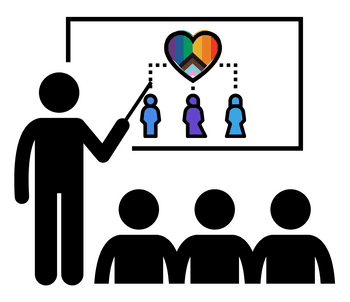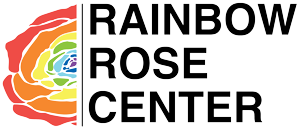Rainbow Rose Center develops custom training sessions for clients to help them better understand the LGBTQIA+ community, including our rights, risks, and needs. Some of our standard training materials cover the following topics:

Allyship - gives a general overview of the differences between “Orientation, Identity, and Expression” as well as an in-depth explanation on each part of the LGBTQIA+ acronym. Additionally, the training covers some of the basics on what being an “ally” means, pronoun use, and some easy steps on how to be a better ally.
Health - covers the LGBTQIA+ Community’s health risks, disabilities, and healthcare. Can be tailored to provide up-to-date localized information (when available) gathered from local/national surveys, and can also focus on a specific portion of the community, such as gender diverse patients or co-concurring physical and mental health aspects.
Domestic Violence - provides detailed insight as well as statistics on the various types of domestic violence the LGBTQIA+ Community is at risk of facing. It also examines how this type of violence is viewed by those outside of the relationship, including by law enforcement and within our schools.
Politics - provides a non-partisan, up to date view on the current state of LGBTQIA+ equality. This includes a historical overview of the rights that the community has gained and what we are still advocating for. It also discusses current legislative topics and open bills that are impacting the community.
Youth - examines the challenges that our youth face both at home and at school. Details the coming out process, the risk of homelessness, teen dating violence, and substance dependency/addiction.
Aging - explains the challenges that the LGBTQIA+ aging population faces. This includes aspects on care giving, assisted living and nursing homes, health disparities, and physical and social isolation. Also provides insight on how to create a more inclusive community for those Aging with Pride.
Transitioning - provides a general overview of the transgender community, including an explanation of the differences between sex and gender. Deconstructs assumptions regarding the transitioning process while examining challenges facing the transgender community, including dysphoria, the process of transitioning, legal concerns, stigma/harassment/discrimination, access to public accomodations and participation restrictions, and violence.
Intersectionality - discusses the unique marginalized experiences LGBTQIA+ individuals may face based on their gender identity, race, ethnicity, abilities, religion, political views, etc. The combination of any of these factors may lead to additional aspects of discrimination or privilege. Having a better understanding of Intersectionality as it applies to the LGBTQIA+ community allows participants to better empathize with the whole person’s identity.
Family Impact - goes into detail about the Coming Out process and the impact it can have on relationship dynamics. Whether this is applicable to the participants or not, having a better understanding of the courage it takes to “come out” and how to best respond to someone entrusting you with this information helps participants become better allies.
